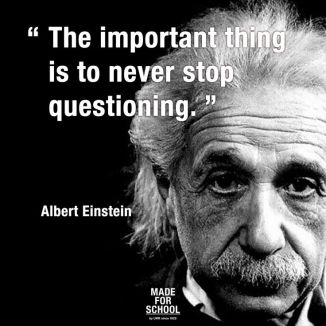 “Questioning is a more subtle and complex skill than many realize, involving three kinds of sophisticated thinking-divergent, convergent, and meta cognitive” (Berger, p.66, 2016). Children begin questioning without fear at a young age, but as they grow older, the questioning ceases and limits creativity and exploration. As technology continues to have more involvement in society, problem solving and questioning is at more of a demand.
“Questioning is a more subtle and complex skill than many realize, involving three kinds of sophisticated thinking-divergent, convergent, and meta cognitive” (Berger, p.66, 2016). Children begin questioning without fear at a young age, but as they grow older, the questioning ceases and limits creativity and exploration. As technology continues to have more involvement in society, problem solving and questioning is at more of a demand.
So why do we stop asking questions? The current educational system does not teach, encourage, or allow questioning in the classroom. It continually puts teachers under pressure to cover quantity of material and limits the focus of quality education. In the typical classroom, the teacher prompts students by creating their own formulated question inadvertently contributing to the idea that only the children who know the correct answer are allowed to ask questions. This environment does not inspire creativity or stimulate curiosity and students are no longer asking questions or doing exploration of their own.
A More Beautiful Question: The Power of Inquiry to Spark Breakthrough Ideas, Berger states, “When we start teaching too much, too soon, we are cutting off paths of inquiry and exploration that children often pursue on their own. They need to be permitted to do raise and explore their own questions through experimentation without the burden of instructions. This allows them to exhibit signs of creativity and curiosity” (p.43, 2014). Students need to learn how to ask questions about values, meaning, and purpose rather than just the technocratic ones that Google or Siri can answer. Effective inquiry allows us to explore, probe, access, and determine what to do with the answers that technology can provide.
As instructors in the classroom, we are not encouraging our students how to ask questions using the “Why, How, or What if” framework Asking “why” is the first step to bringing change to the classroom environment. Through the implementation of exploration and making, we can create a journey of inquiry that is bound to lead students into the unknown and help them develop their questioning. We must get away from the force-fed questioning that exists now to allow for exploration in learning.
In Berger’s blog, Encouraging Student Questioning, he aks teachers to weigh in on the problem of limited questioning in the classroom. Dominic Randolf suggests using design thinking or implementing a “Why, How, or What if” framework to encourage students to ask difficult questions with the potential of systematic questioning. This framework not only teaches students questioning, but prepares them for future projects in their adult lives. It also encourages an entrepreneurial mindset in the schools to prompt better inquiry. Innovation, creativity, and adaptation are linked to questioning which can be incorporated through the use of co-curriculum, making, and experiential education.
Educators should encourage exploration by permitting experiential questioning into learning and professional development courses. As technology increasingly becomes integrated into education and training, there will be a higher demand for more creative problem solving to guarantee effective knowledge transfer. As a program training assistant at Michigan State University, I can see the interest for e-Learning rapidly growing and not only finding its way into higher education and professional development, but in K-12 education. The problem with the learner not asking questions in the classroom is only going to become more difficult for educators unless we can start incorporating questioning, exploration, and making into our classrooms.
References:
Berger, W. (2014). A More Beautiful Question: The Power of Inquiry to Spark Breakthrough Ideas. Bloomsbury Publishing Plc.
Berger, W. (n.d.). Encouraging Student Questioning. Retrieved from: http://amorebeautifulquestion.com/encouraging-student-questioning/



Your synopsis of Berger’s “Why we do we stop asking questions?” was concise and thoughtful. I really liked the quote you selected about “paths of inquiry”. It poignantly described the over-teaching that occurs in many classrooms and the need for independent student exploration and inquiry. Within your role at MSU, you must be seeing an explosion of technology utilization in classrooms. Do you think schools of education are preparing teachers adequately in effective technology utilization? I don’t mean programs like MAET, which is strategically focused in that way, but the general bachelors or masters educational curriculum.
LikeLike
Responding to your question, “Do you think schools of education are preparing teachers adequately in effective technology utilization?” Unfortunately I am in the beginning stages with using technology in education, so I don’t really see how it affects the curriculum. I work as a Program Training Assistant in central administration and want to help them flip their certification series in seat course. I love the idea of innovation in training, professional development, and education which is why i began the MAET program at MSU.
Innovation is definitely playing a huge role in how we educate, and teacher preparation is essential to it being effective. In addition, educators need to have the initiative to learn these new advances and use resources that are provided to them. As far as K-12 teachers, I often wonder how much training and professional development is encouraged and/or provided to them by their districts?
LikeLiked by 1 person